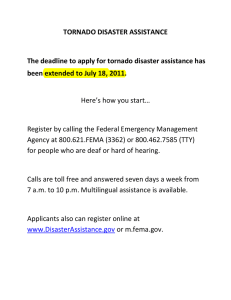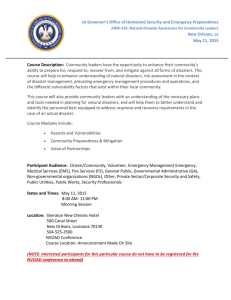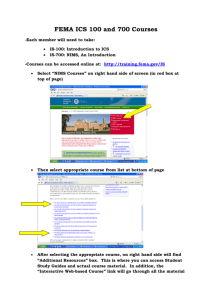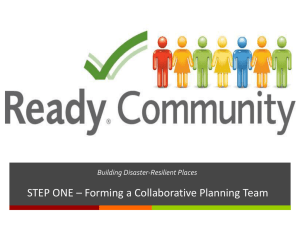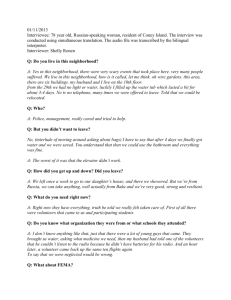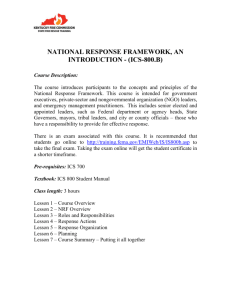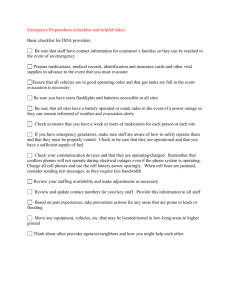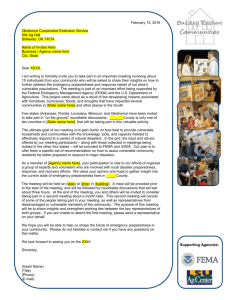1
advertisement
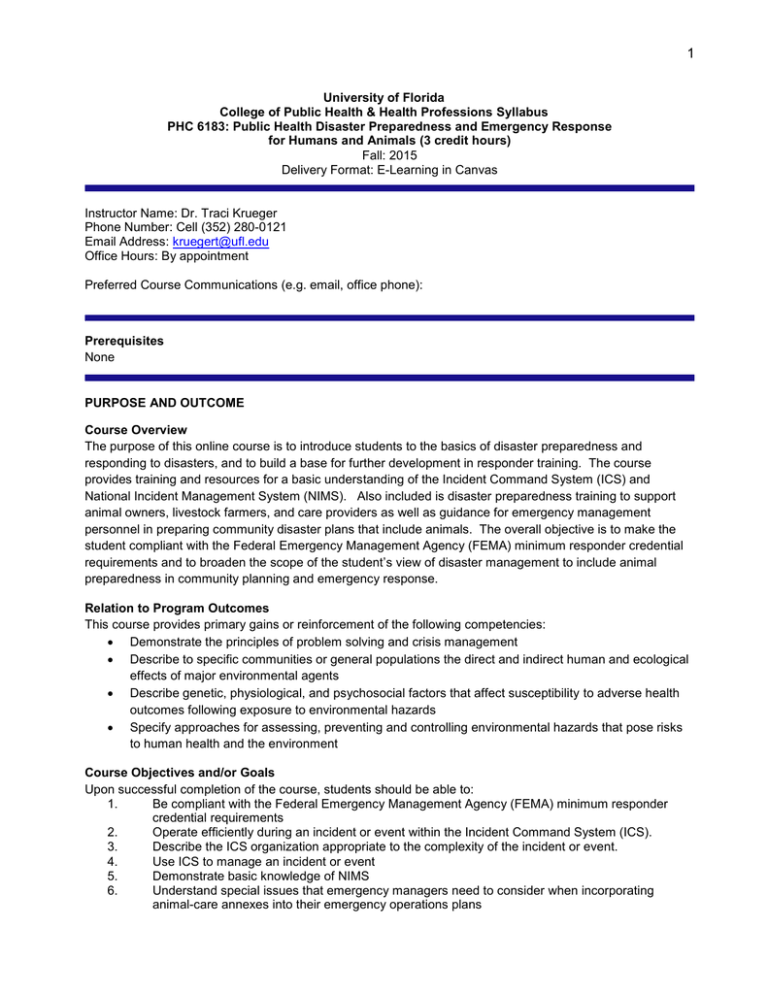
1 University of Florida College of Public Health & Health Professions Syllabus PHC 6183: Public Health Disaster Preparedness and Emergency Response for Humans and Animals (3 credit hours) Fall: 2015 Delivery Format: E-Learning in Canvas Instructor Name: Dr. Traci Krueger Phone Number: Cell (352) 280-0121 Email Address: kruegert@ufl.edu Office Hours: By appointment Preferred Course Communications (e.g. email, office phone): Prerequisites None PURPOSE AND OUTCOME Course Overview The purpose of this online course is to introduce students to the basics of disaster preparedness and responding to disasters, and to build a base for further development in responder training. The course provides training and resources for a basic understanding of the Incident Command System (ICS) and National Incident Management System (NIMS). Also included is disaster preparedness training to support animal owners, livestock farmers, and care providers as well as guidance for emergency management personnel in preparing community disaster plans that include animals. The overall objective is to make the student compliant with the Federal Emergency Management Agency (FEMA) minimum responder credential requirements and to broaden the scope of the student’s view of disaster management to include animal preparedness in community planning and emergency response. Relation to Program Outcomes This course provides primary gains or reinforcement of the following competencies: Demonstrate the principles of problem solving and crisis management Describe to specific communities or general populations the direct and indirect human and ecological effects of major environmental agents Describe genetic, physiological, and psychosocial factors that affect susceptibility to adverse health outcomes following exposure to environmental hazards Specify approaches for assessing, preventing and controlling environmental hazards that pose risks to human health and the environment Course Objectives and/or Goals Upon successful completion of the course, students should be able to: 1. Be compliant with the Federal Emergency Management Agency (FEMA) minimum responder credential requirements 2. Operate efficiently during an incident or event within the Incident Command System (ICS). 3. Describe the ICS organization appropriate to the complexity of the incident or event. 4. Use ICS to manage an incident or event 5. Demonstrate basic knowledge of NIMS 6. Understand special issues that emergency managers need to consider when incorporating animal-care annexes into their emergency operations plans 2 7. 8. 9. Provide sufficient information for emergency management officials and animal owners/caregivers to meet and develop meaningful and effective plans that improve the care of animals, their owners, and the animal-care industries in disasters. Have a general understanding of issues that arise when disasters affect livestock including common causes and typical consequences. Communicate effectively with farmers about causes, impacts, and consequences of disasters affecting livestock in their communities and how to mitigate the effects. Instructional Methods 1) Lectures: These are for general orientation. 2) FEMA Modules: These are integral to the course content. 3) Readings and Resources: In addition to the required text, supplementary readings and resources may be posted in the course. The reading list may be supplemented during the course. 4) Assessments: A variety of assessments will be used in this course, including assignments to present evidence of completion of the FEMA Modules, case studies and discussions, and a final project. What is expected of you? You are expected to actively engage in the course throughout the semester. Your participation fosters a rich course experience for you and your peers that facilitate overall mastery of the course objectives. DESCRIPTION OF COURSE CONTENT Topical Outline/Course Schedule Part 1: Basics of Disasters and Response Modules Date(s) Topic(s) Readings 1 8/24 Introduction to to Disaster 9/16 Preparedness and Emergency Response 2 8/24 Types of Disasters Public Health to and Their Management of 9/16 Consequences, Disasters: The Role and Practice Guide: Responsibility of Chapter 1, 2, Public Health and 4 3 8/24 Case Study of an Case Studies in to Emerging Infection: Public Health 9/16 The 2009 H1N1 Preparedness Pandemic and Response Response to Disasters: Case 13 Assignments CASE STUDY 1: Case 13 - H1N1 Pandemic 2009 is due before11:59 PM on 9/16. Assignment and Discussion 3 Part 2: Preparedness and Response in Humans Modules Date(s) Topic(s) Readings 4 9/17 Introduction to the Public Health to Incident Command Management of 10/28 System (ICS): Disasters: The ICS Overview and Practice Guide: Basic Features, Chapter 3 Incident Commander & Command Staff Functions, General Staff Functions, ICS Facilities, Common Responsibilities 5 9/17 ICS for Single Public Health to Resources and Management of 10/28 Initial Action Disasters: The Incidents, Practice Guide: Leadership & Chapters 5 and Management, 6 Delegation of Authority & Management by Objectives, Functional Areas & Positions, Briefings, Organizational Flexibility, Transfer of Command 6 9/17 Introduction to Public Health to National Incident Management of 10/28 Management Disasters: The System (NIMS), Practice Guide: NIMS Chapter 3 Preparedness, (review) NIMS Communications and Information Management, NIMS Resource Management, NIMS Command and Management 7 9/17 Case Study of a Case Studies in to Man-Made Public Health 10/28 Disaster: Preparedness World Trade and Response Center September to Disasters: 11th Attack Case 10 Assignments FEMA Course ICS-100.B: http://training.fema.gov/EMIWeb/IS/IS100B.asp The certificate is due before 11:50 PM on 10/28. FEMA Course ICS-200.B: http://training.fema.gov/EMIWeb/IS/IS200B.asp The certificate is due before 11:59 PM on10/28. FEMA Course IS-700.A: http://training.fema.gov/EMIWeb/IS/is700a.asp The certificate is due before 11:50 PM on10/28. CASE STUDY 2: Case 10 - World Trade Center September 11th Attack is due before 11:59 PM on10/28. Assignment and Discussion 4 Part 3: Preparedness and Response in Animals Module Date(s) Topic(s) Readings s 8 10/29 Animals in FL SART to Disaster: website: 12/9 Awareness and http://flsart.org/S Preparedness, The ART/tm?pageID Four Phases of =2# Emergency Presentation: Management, Identifying Defining the Risks Community and Applying the Needs and Four Phases, The Resources Care of Animals in Presentation: Disaster Emergency First Aid for Dogs and Cats 9 10/29 to 12/9 10 10/29 to 12/9 11 10/29 to 12/9 Animals in Disaster: Community Planning, Disaster Preparedness through Planning & Collaboration, Analyzing Risks Affecting Animals and their Owners, Organization of the Response to Disasters, Recovering from a Disaster, Developing Community Support for Disaster Preparedness Plan Livestock in Disasters, Common Hazards and Typical Consequences of Disasters, Disaster Response Case Study of a Natural Disaster: Floyd Flood Assignments FEMA Course IS-10: http://training.fema.gov/EMIWeb/IS/courseOv erview.aspx?code=IS-10. The certificate is due before 11:50 PM on12/9. FL SART website: http://flsart.org/S ART/tm?pageID =2# Presentation: Sheltering Options in Mass Evacuations Presentation: Preparing an Action Plan FEMA Course IS-11a: http://training.fema.gov/EMIWeb/IS/courseOv erview.aspx?code=IS-11.a The certificate is due before 11:59 PM on 12/9. FL SART website: http://flsart.org/S ART/tm?pageID =2# Presentation: Foreign Animal Disease Recognition Presentation: Emergency Management of Large Animals Case Studies in Public Health Preparedness and Response to Disasters: Case 3 FEMA Course IS-111: http://training.fema.gov/EMIWeb/IS/courseOv erview.aspx?code=IS-111.a The certificate is due before 11:59 PM on12/9. CASE STUDY 3: Case 3 - Floyd Flood is due before 12/9 at 11:59PM. Assignment and Discussion The Final Project is due before 11:59 PM on 12/9. 5 Course Materials and Technology 1. Required Text: Public Health Management of Disasters: The Practice Guide by Linda Young Landesman. Published by the American Public Health Association 2. Required Text: Case Studies in Public Health Preparedness and Response to Disasters by Linda Young Landesman and Isaac B. Weisfuse. Published by Jones & Bartlette Learning. 3. Powerpoints, documents, assignments, and/or discussion boards found on the eLearning course website. 4. Online FEMA training: Independent Study Program found at http://training.fema.gov/IS/crslist.asp ****You will need to acquire a FEMA Student Identification Number (SID) to gain access and complete the FEMA certificate exams (also called the Independent Study final exams). Please register at the following link to get your FEMA SID number: https://cdp.dhs.gov/femasid/register For technical support for this class, please contact the UF Help Desk at: ● Learning-support@ufl.edu ● (352) 392-HELP - select option 2 ● https://lss.at.ufl.edu/help.shtml ACADEMIC REQUIREMENTS AND GRADING Assignments FEMA certificates of completion: There are six FEMA training courses, each with an online exam consisting of 25-50 multiple choice questions. These six exams will be graded by the EMI and a passing score is 75% or greater. The exams are open book. The student will be notified by email whether they passed or not. The EMI will issue via email a certificate of course completion to students that pass the exam. These certificates can be saved as a PDF file and also printed. Students will need to present their certificates of completion to the course coordinator via submission as an attachment on the eLearning website. Each of the six exams is worth 7 points for a combined total of 42% your final grade. Certificates of completion are due before 11:59PM on the dates listed in the chart below. Case Studies and Discussion Board: There are three case studies, one in each part of the course. The cases are found in the required text Case Studies in Public Health Preparedness and Response to Disasters. Each case study includes one written assignment and a minimum of one discussion board post per case study. Each case study will have two “starter question/topic” threads awaiting responses under the Discussion tab. You can choose to post a reply to one of these two, or you can post about something else related to the case study in the thread labeled as “Open Discussion” for that case study. You will only be awarded two points per case study, no extra points are given for posting in multiple discussion threads for the same case study (although multiple posts are welcome and encouraged). Each of the three assignments is worth 8 points for a combined total of 24% of your final grade. Each case study discussion board post is worth 2 points for a combined total of 6% of your final grade. Due dates for case study assignments and discussion board posting are listed in the chart below. For Discussion board postings you have the option to post a written/text response or an oral (voice recording) response. Final Project : You will be given the choice between two projects: creating a personal preparedness plan or creating a preparedness plan for an animal facility. The assignment will be due at the end of the semester after you have successfully completed the FEMA courses, and it is designed for you to demonstrate an understanding of practical use of the knowledge gained in this course. No extra credit will be given for completing more than one final project. The final project is worth 28 points (28% final grade). The final project is due before 11:59PM on the date listed in the chart below. 6 Grading Requirement Due date Points or % of final grade Case Study 1 9/16 by 11:59PM 8 points or 8% of final grade Case Study 1 Discussion 9/16 by 11:59PM 2 points or 2% of the final grade FEMA ICS100b 10/28 by 11:59PM 7 points or 7% of final grade FEMA ICS200b 10/28 by 11:59PM 7 points or 7% of final grade FEMA IS700a 10/28 by 11:59PM 7 points or 7% of final grade Case Study 2 10/28 by 11:59PM 8 points or 8% of final grade Case Study 2 Discussion 10/28 by 11:59PM 2 points or 2% of final grade FEMA IS-10 12/9 by 11:59PM 7 points or 7% of final grade FEMA IS-11a 12/9 by 11:59PM 7 points or 7% of final grade FEMA IS-111 12/9 by 11:59PM 7 points or 7% of final grade Case Study 3 12/9 by 11:59PM 8 points or 8% of final grade Case Study 3 Discussion 12/9 by 11:59PM 2 points or 2% of final grade Final Project 12/9 by 11:59PM 28 points or 28% of final grade Total Point System Used Points 90 87 earned to to 100 89 Letter A AGrade 100 points or 100% 83 to 86 80 to 82 77 to 79 73 to 76 70 to 72 67 to 69 63 to 66 60 to 62 57 to 59 <57 B+ B B- C+ C C- D+ D D- E Please be aware that a C- is not an acceptable grade for graduate students. In addition, a grade of C counts toward a graduate degree only if an equal number of credits in courses numbered 5000 or higher have been earned with an A. Letter Grade Grade Points A A- B+ B B- C+ C C- D+ D D- E WF I NG 4.0 3.67 3.33 3.0 2.67 2.33 2.0 1.67 1.33 1.0 0.67 0.0 0.0 0.0 0.0 SU 0.0 For greater detail on the meaning of letter grades and university policies related to them, see the Registrar’s Grade Policy regulations at: http://catalog.ufl.edu/ugrad/current/regulations/info/grades.aspx 7 Policy Related to Make up Exams or Other Work Personal issues with respect to fulfillment of course requirements will be handled on an individual basis. Late submissions will not be accepted without instructor approval prior to the submission deadline. Please note: Any requests for make-ups due to technical issues MUST be accompanied by the ticket number received from LSS when the problem was reported to them. The ticket number will document the time and date of the problem. You MUST e-mail me within 24 hours of the technical difficulty if you wish to request a make-up. Policy Related to Required Class Attendance All faculty are bound by the UF policy for excused absences. For information regarding the UF Attendance Policy see the Registrar website for additional details: https://catalog.ufl.edu/ugrad/current/regulations/info/attendance.aspx STUDENT EXPECTATIONS, ROLES, AND OPPORTUNITIES FOR INPUT Expectations Regarding Course Behavior Students are expected to behave with courtesy befitting a professional student. Communication Guidelines Student-Instructor communication will be primarily via the elearning course site—this may be by course mail, assignment comment section, announcements, or discussion board. Students may also contact the instructor directly by email (kruegert@ufl.edu) or via phone (352 280-0121 between the hours of 8:00 AM and 7:00 PM EST). Academic Integrity Students are expected to act in accordance with the University of Florida policy on academic integrity. As a student at the University of Florida, you have committed yourself to uphold the Honor Code, which includes the following pledge: “We, the members of the University of Florida community, pledge to hold ourselves and our peers to the highest standards of honesty and integrity.” You are expected to exhibit behavior consistent with this commitment to the UF academic community, and on all work submitted for credit at the University of Florida, the following pledge is either required or implied: “On my honor, I have neither given nor received unauthorized aid in doing this assignment.” It is your individual responsibility to know and comply with all university policies and procedures regarding academic integrity and the Student Honor Code. Violations of the Honor Code at the University of Florida will not be tolerated. Violations will be reported to the Dean of Students Office for consideration of disciplinary action. For additional information regarding Academic Integrity, please see Student Conduct and Honor Code or the Graduate Student Website for additional details: https://www.dso.ufl.edu/sccr/process/student-conduct-honor-code/ http://gradschool.ufl.edu/students/introduction.html Please remember cheating, lying, misrepresentation, or plagiarism in any form is unacceptable and inexcusable behavior. Online Faculty Course Evaluation Process Students are expected to provide feedback on the quality of instruction in this course by completing online evaluations at https://evaluations.ufl.edu. Evaluations are typically open during the last two or three weeks of the semester, but students will be given specific times when they are open. Summary results of these assessments are available to students at https://evaluations.ufl.edu/results/. 8 SUPPORT SERVICES Accommodations for Students with Disabilities If you require classroom accommodation because of a disability, you must register with the Dean of Students Office http://www.dso.ufl.edu within the first week of class. The Dean of Students Office will provide documentation of accommodations to you, which you then give to me as the instructor of the course to receive accommodations. Please make sure you provide this letter to me by the end of the second week of the course. The College is committed to providing reasonable accommodations to assist students in their coursework. Counseling and Student Health Students sometimes experience stress from academic expectations and/or personal and interpersonal issues that may interfere with their academic performance. If you find yourself facing issues that have the potential to or are already negatively affecting your coursework, you are encouraged to talk with an instructor and/or seek help through University resources available to you. The Counseling and Wellness Center 352-392-1575 offers a variety of support services such as psychological assessment and intervention and assistance for math and test anxiety. Visit their web site for more information: http://www.counseling.ufl.edu. On line and in person assistance is available. You Matter We Care website: http://www.umatter.ufl.edu/. If you are feeling overwhelmed or stressed, you can reach out for help through the You Matter We Care website, which is staffed by Dean of Students and Counseling Center personnel. The Student Health Care Center at Shands is a satellite clinic of the main Student Health Care Center located on Fletcher Drive on campus. Student Health at Shands offers a variety of clinical services. The clinic is located on the second floor of the Dental Tower in the Health Science Center. For more information, contact the clinic at 392-0627 or check out the web site at: https://shcc.ufl.edu/ Crisis intervention is always available 24/7 from: Alachua County Crisis Center (352) 264-6789 http://www.alachuacounty.us/DEPTS/CSS/CRISISCENTER/Pages/CrisisCenter.aspx Do not wait until you reach a crisis to come in and talk with us. We have helped many students through stressful situations impacting their academic performance. You are not alone so do not be afraid to ask for assistance.
